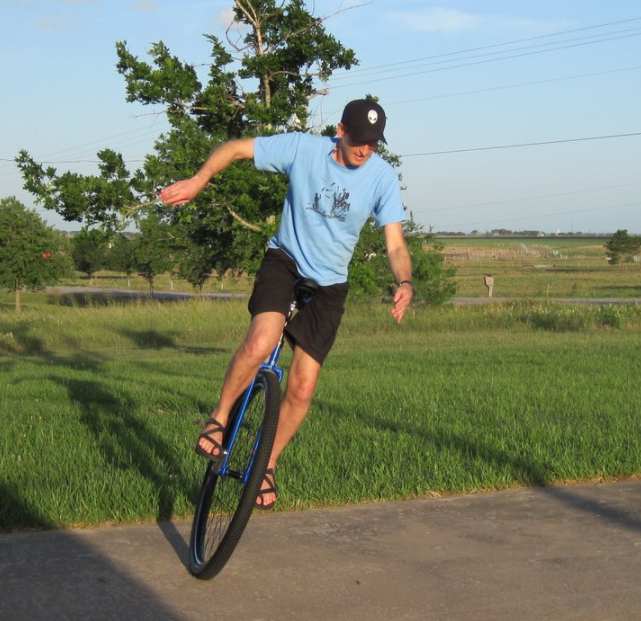Riding a unicycle requires skill, coordination, balance, and above all else, the use of both legs.
Imagine being passionate about your hobby of unicycling and facing the loss of a leg to amputation due to a vascular condition known as PAD, or peripheral artery disease.
This scenario was one that CTVS patient Duane Campbell–an avid unicyclist–faced five years ago. He experienced intense leg pain and cramping for months to the point where he could barely walk the length of his driveway. He chalked it up to muscle strain from unicycling. Eventually the pain became unbearable, so Duane went to his primary care physician who determined he had intermittent claudication, a serious side effect of PAD that causes excruciating pain in the legs or buttocks due to blood flow blockage in the arteries.
CTVS surgeons performed emergency bypass surgery and implanted a stent to encourage better blood flow.
PAD affects more than six million Americans and is caused by fatty plaque build-up in peripheral arteries and veins (typically in the legs), which then slows circulation, causes acute and chronic pain, and leads to serious foot or leg ulcers that are difficult to heal. If left untreated, this poor circulation in the limbs can even lead to amputation in extreme cases.
Upon discharge from the hospital following his procedure, it was CTVS board-certified vascular surgeon Dr. Mazin Foteh who met with Duane and delivered a frank warning to him that if he didn’t better manage his PAD, and stop smoking (a major risk factor for PAD), he might not be so lucky next time and could ultimately face losing his leg to amputation–and he could forget about unicycling forever.
Duane says that conversation with Dr. Foteh was exactly what he needed to hear to prompt him to quit smoking. “Dr. Foteh gave me the wake-up call that I needed to quit. I had been relatively healthy otherwise, and frankly too young to have PAD and these vascular issues, so I became determined to quit smoking forever.”
In the years since his initial emergency procedure, Duane has also had angioplasty (a procedure conveniently done in the CTVS Vascular Intervention Suite) in that leg and later in the other one to keep the veins and arteries healthy and regulate circulation.
Through all of his treatments and follow-up care, Duane and Dr. Foteh have developed a mutual affection for one another. They have run into each other around Austin, like under the Mopac pedestrian bridge downtown, and at the Blanton Museum where Duane was providing atmosphere as a juggler (another one of his high-octane hobbies) while Dr. Foteh took in a new art exhibit.
Duane says it’s fun to see him outside the clinic. “I really like him not just as my doctor, but also very much as a person.”
“Duane is an excellent patient and should be commended on how he took control of his health and stopped smoking,” says Dr. Foteh. “PAD is very treatable, and you can lead a very full and active life provided you prioritize your health and keep other medical conditions in check–such as diabetes, blood pressure, and cholesterol–that often occur alongside PAD.”
Duane is doing great these days and visits with Dr. Foteh about every six months to monitor his condition. He is managing it well with medication to improve circulation and regular exercise, like taking walks with his wife, and of course, riding his unicycle — which he says he happily does about two to three times a week.
When our patients are happy, we are happy.
If you have questions about effective treatments for managing your PAD, please visit ctvstexas.com or call us at (512) 459-8753 to schedule an appointment with one of our board-certified specialists.
Don’t forget to follow us on Facebook and Twitter and check our blog for regular updates.

